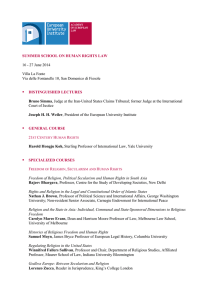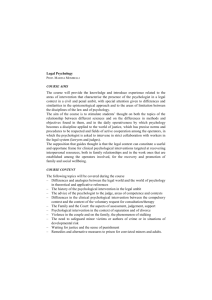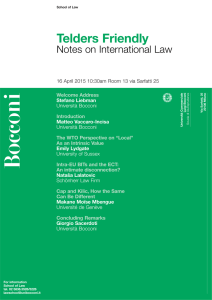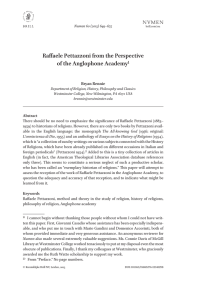Kuliah Tamu, Peluncuran Buku Pengembangan Ilmu Hukum
advertisement
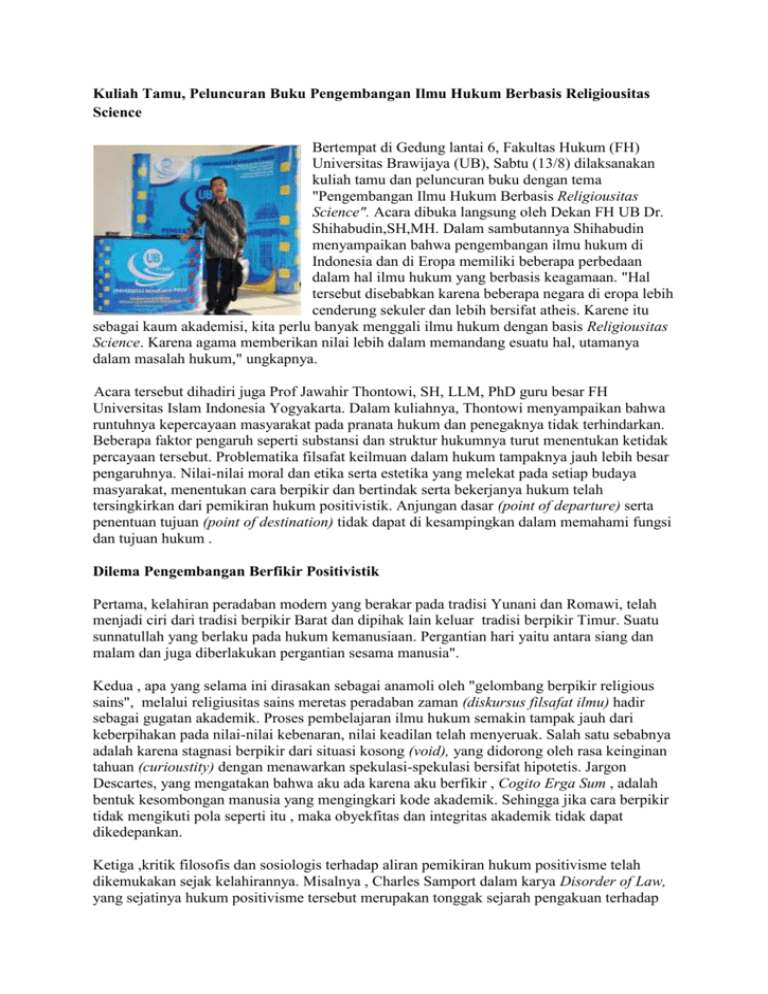
Kuliah Tamu, Peluncuran Buku Pengembangan Ilmu Hukum Berbasis Religiousitas Science Bertempat di Gedung lantai 6, Fakultas Hukum (FH) Universitas Brawijaya (UB), Sabtu (13/8) dilaksanakan kuliah tamu dan peluncuran buku dengan tema "Pengembangan Ilmu Hukum Berbasis Religiousitas Science". Acara dibuka langsung oleh Dekan FH UB Dr. Shihabudin,SH,MH. Dalam sambutannya Shihabudin menyampaikan bahwa pengembangan ilmu hukum di Indonesia dan di Eropa memiliki beberapa perbedaan dalam hal ilmu hukum yang berbasis keagamaan. "Hal tersebut disebabkan karena beberapa negara di eropa lebih cenderung sekuler dan lebih bersifat atheis. Karene itu sebagai kaum akademisi, kita perlu banyak menggali ilmu hukum dengan basis Religiousitas Science. Karena agama memberikan nilai lebih dalam memandang esuatu hal, utamanya dalam masalah hukum," ungkapnya. Acara tersebut dihadiri juga Prof Jawahir Thontowi, SH, LLM, PhD guru besar FH Universitas Islam Indonesia Yogyakarta. Dalam kuliahnya, Thontowi menyampaikan bahwa runtuhnya kepercayaan masyarakat pada pranata hukum dan penegaknya tidak terhindarkan. Beberapa faktor pengaruh seperti substansi dan struktur hukumnya turut menentukan ketidak percayaan tersebut. Problematika filsafat keilmuan dalam hukum tampaknya jauh lebih besar pengaruhnya. Nilai-nilai moral dan etika serta estetika yang melekat pada setiap budaya masyarakat, menentukan cara berpikir dan bertindak serta bekerjanya hukum telah tersingkirkan dari pemikiran hukum positivistik. Anjungan dasar (point of departure) serta penentuan tujuan (point of destination) tidak dapat di kesampingkan dalam memahami fungsi dan tujuan hukum . Dilema Pengembangan Berfikir Positivistik Pertama, kelahiran peradaban modern yang berakar pada tradisi Yunani dan Romawi, telah menjadi ciri dari tradisi berpikir Barat dan dipihak lain keluar tradisi berpikir Timur. Suatu sunnatullah yang berlaku pada hukum kemanusiaan. Pergantian hari yaitu antara siang dan malam dan juga diberlakukan pergantian sesama manusia". Kedua , apa yang selama ini dirasakan sebagai anamoli oleh "gelombang berpikir religious sains", melalui religiusitas sains meretas peradaban zaman (diskursus filsafat ilmu) hadir sebagai gugatan akademik. Proses pembelajaran ilmu hukum semakin tampak jauh dari keberpihakan pada nilai-nilai kebenaran, nilai keadilan telah menyeruak. Salah satu sebabnya adalah karena stagnasi berpikir dari situasi kosong (void), yang didorong oleh rasa keinginan tahuan (curioustity) dengan menawarkan spekulasi-spekulasi bersifat hipotetis. Jargon Descartes, yang mengatakan bahwa aku ada karena aku berfikir , Cogito Erga Sum , adalah bentuk kesombongan manusia yang mengingkari kode akademik. Sehingga jika cara berpikir tidak mengikuti pola seperti itu , maka obyekfitas dan integritas akademik tidak dapat dikedepankan. Ketiga ,kritik filosofis dan sosiologis terhadap aliran pemikiran hukum positivisme telah dikemukakan sejak kelahirannya. Misalnya , Charles Samport dalam karya Disorder of Law, yang sejatinya hukum positivisme tersebut merupakan tonggak sejarah pengakuan terhadap kepastian hukum. Dalam ranah Das Sollen Das Sein adalah penuh ketidak teraturan ( disorder ) , penuh ketidak seragaman ( disunformity ). Karena itu, tidak mungkin mempelajari hukum secara liniear atau tunggal. Pemahaman hukum secara terpadu dan sistemik merupakan keniscayaan. Keempat, pilihan tradisi berfikir Timur juga merupakan anomali yang tidak terbatas dari tudingan kaum sekuler dalam proses pemahaman suatu disiplin keilmuan. Kerangka awal obyektivitas hingga sampai pada tingkat klaim kebenaran bukan sekedar ditentukan oleh adanya fakta korespondensi dengan model, pembuktian dari tingkat empirik yang terukur. Lebih dari itu, justru adanya ketidak lazimandari status quo tradisi berpikir Barat yang didasarkan kepada suatu acuhan fundamental yang meniscayakan adanya ruang pengakuan escatologis dan keimanan (faith). Dalam tradisi berpikir Timur, konsep agama bukan saja tidak dapat dipisahkan dari Negara, tetapi juga berfungsi menjadi sukma atau darah dalam pengembangan ilmu pengetahuan dan juga teknoligi yang lebih humanis . Kelima, pergeseran posisi kejayaan Barat tampaknya tidak dapat disangkal ketika negaranegara dengan tradisi berpikir Timur telah mulai menjadi rivalitas Barat. Dambisa Moyo dalam karyanya How The West Was Lost (2011) telah menunjukan indikator yang tidak mudah dipungkiri bahwa kegemilangan peradapan Barat telah mulai tergeser. Pertanyaannya tidak lagi bagaimana Barat memperoleh kegemilangan. Tentu saja, tulisan Dambisa tersebut tidak dapat ditafsirkan secara hitam putih, bahwa peradaban Barat telah tenggelam atau mengalami kekalahan. Tetapi lebih menggambarkan pada suatu keadaan dimana peradaban Timur sudah mulai mengancam peradaban Barat. Agama Dalam Ilmu Hukum Menempatkan basis teologis (ketuhanan) dalam latar epistimologis ilmu hukum, bukan gagasan irasional tanpa argumen. Mata rantai pertumbuhan ilmu pengetahuan hukum yang dapat dilacak dari zaman klasik Yunani, Mesir kuno, China dan negara-negara lainnya memperlihatkan keterkaitan historis tersebut. Bilamana ada pendapat bahwa Agama sebagai bapak Ilmu pengetahuan (the father of science), maka filsafat dipandang sebagai ibunya Ilmu pengetahuan (the mother of science). Agama Sebagai Sistem Nilai/Pandangan Hidup Tiga ratus tahun sebelum isa lahir , pertanyaan tentang siapakan otoritas pembuat aturan hukum selain raja dan pengusaha, maka jawabanya yang muncul adalah Tuhan. Posisi ajaran Agama dalam hukum menjadi sangat penting, bukan saja karena agama mengandung prinsipprinsip, nilai-nilai universal, sebagai pedoman parameter uji bagi kebenaran-kesalahan, kebaikan-keburukannya suatu norma hukum dapat menyatukan pemahaman tentang substitusi hukum, tetapi agama dapat mendorong terlahirnya hukum-hukum suatu negara menjadi menginternasional. Agama Mendorong Internasionalisasi Keberadaan agama sebagai basis ilmu hukum ternyata Oleh Cicero dipandang sebagai titik temu yang menyeragamkan pikiran masyarakat Yunani dengan Romawi. Prinsip-prinsip tentang hak kemerdekaan, atau kebebasan, hak untuk berpendapat dan bekerja, hak untuk toleransi saling menolong, prinsip kesetaraan dalam hukum, prinsip kejujuran dan keterbukaan, prinsip keadilan, perdamaian dan kemakmuran bersumber pada ajaran agama melalui wahyu. Sebagaimana Hukum Hammurabi dan The Ten Commandment yang melarang zina, membunuh, menganiaya, hukuman denda, hukuman seimbang (retaliation law). Agama Sebagai Ideologi Hukum Nasional Jika diperhatikan perkembangan sistem hukum di Barat, klaim utama mereka adalah agama dan negara terpisah. Sebagaimana pula sistem hukum tidak berkaitan dengan agama. Namun secara kultural klaim agama dan hukum terpisah tidak sepenuhnya benar. Sebab, institusi non-negara, seperti Vatikan terbukti memiliki kedekatan dengan proses pembuatan hukum Kanonik yang berlaku di seluruh dunia. Karena, itu meskipun konstitusi Negara-negara Barat tidak menyebutkan agama sebagai ideologi negara atau cita-cita hukum (rechtidee), agama sebagai sistem nilai tidak dapat dipungkiri mempengaruhi pola pikir, perilaku, dan perbuatan. Agama dan Legal Subtitution Dalam Masyarakat Non-Moderen Mengapa posisi Agama dalam ilmu hukum penting adalah terkait dengan fungsinya sebagai "ruh atau spirit" lahirnya kesadaran moralitas manusia. Dengan kata lain, moralitas, etika dan estatika yang memiliki sifat universal jika memiliki landasan yang kokoh dari ajaran agama. Harold J. Breman, tergolong naif ketika dihadapi pada tradisi berpikir barat. Sebab bagi dia, hukum adalah kematian jika tanpa agama atau sejenisnya. For Him, Law is Dead without relegion or some substitute therefor". [pon] A Guest Lecturing, Launching a Book about Development of Jurisprudence based on Science Religiosity Located in the 6th floor, Faculty of Law (FH) Universitas Brawijaya (UB) on Saturday (13/8) held a guest lecturing and a book launching with the theme "Development of of Jurisprudence Based on Science Religiosity". The event was opened by the Dean of FH UB, Dr. Shihabudin, SH, MH. In his speech, Shihabudin said that the development of jurisprudence in Indonesia and Europe have some differences in terms of religion-based jurisprudence. "This was due to some countries in Europe are more likely to be more secular and atheist. Therefore, as academics, we need to dig a lot on jurisprudence with the basis of science Religiosity. Because religion gives something more valuable in looking at things, especially in legal matters," he said. The event was also attended by Prof. Jawahir Thontowi, SH, LLM, PhD, a professor of Faculty of Law Universitas Islam Indonesia Yogyakarta. In his lecturing, Thontowi said that the collapse of public confidence in legal institutions and its enforcement was inevitable. Several factors influence such as substance and its legal structure that helped determine disbelief. The problems of philosophy of science in the law appears to be much greater influence. Moral values and ethics and aesthetics inherent in every culture, to determine ways of thinking and acting and working of the law have been eliminated from the positive legal thought. Pavilion base (point of departure) and goal setting (point of destination) cannot be ruled out in understanding the function and purpose of law. The Dilemma of Developing Thinking Positivistic First, the birth of modern civilization are rooted in Greek and Roman tradition, has become the hallmark of the tradition of Western thought and tradition on the other hand out of Eastern thought. A Sunnatullah that apply to humanitarian law. Substitution of the day, i.e., between day and night and also applied to the turn of fellow human beings. " Second, what has been perceived as anamoli by the "wave of religious thinking science ', through the religiosity of science paved the civilization of the age (the discourse of philosophy of science) is present as an academic claims. The learning process jurisprudence increasingly looks away from the partisanship on the values of truth, justice has pushed values. One reason is due to stagnation think of a situation vacant (void), driven by his desire of knowledge (curioustity) by offering hypothetical speculations. Jargon Descartes, who said that I was there because I think, Cogito Sum Erga, is a form of human arrogance which denies the academic code. So if thinking does not follow such a pattern, then objectivity and academic integrity cannot be put forward. Third, philosophical and sociological critique of legal positivism school of thought had been raised since birth. For example, in the work of Charles Samport Disorder of Law, legal positivism, which in essence is a milestone in the recognition of legal certainty. In the realm of Das sollen Das Sein is full of irregularities (disorder), a full non uniformity (disunformity). Therefore, it is impossible to study law liniear or single. Understanding of the law in an integrated and systemic is a necessity. Fourth, the choice of the tradition of Eastern thought is also the anomaly that is not limited to the accusation of the secularists in the process of understanding a scientific discipline. Initial framework to the level of objectivity to truth claims is not simply determined by the fact correspondence with the model, empirical evidence of a measurable level. Moreover, precisely the lack of unusual status quo traditions of western thought is based on a fundamental way which necessitates the recognition of space escatologies and faith. In the tradition of Eastern thought, the concept of religion not only cannot be separated from the State, but also serves a soul or blood in the development of science and also a more human technology. Fifth, the shift position of the triumph of the West does not seem to be denied when the countries with a tradition of thinking has begun to become East West rivalry. Dambisa Moyo in his book, How The West Was Lost (2011) has shown the indicators that are not easily denied that the glories of Western civilization has begun shifting. The question is no longer how to get glories of the West. Of course, writing Dambisa cannot be interpreted in black and white, that Western civilization had been sunk or lost. But rather describes a situation in which the Eastern civilization has begun to threaten Western civilization. Religion in Jurisprudence Placing a theological basis (the divine) in the epistemological background of jurisprudence, not the irrational idea without argument. Chain growth of legal science that can be tracked from the time of classical Greece, ancient Egypt, China and other countries shows that historical linkage. Whenever there is an argument that religion as the father of science (the father of science), then the philosophy of science is seen as the mother of science. Religion As a Value System / Views of Life Three hundred years before the steeplechase was born, the question of the authority spends the rule of law other than the king makers and businessmen, then the answer that emerges is of God. Religion in law teaching position becomes very important, not only because it contains the principles of religion, universal values, to guide the parameter-error test for truth, goodness, ugliness of a legal norm could unify understanding of the substitution law, but religion can encourage the birth of laws of a country becomes internasional. Religion Pushes Internationalization The existence of religion as the basis of legal science was regarded by Cicero as a meeting point which homogenizes the public mind with the Roman Greece. The principles regarding the right of independence, or freedom, the right to think and work, help each other the right to tolerance, the principle of equality in law, the principle of honesty and openness, fairness, peace and prosperity rooted in religion through revelation. As the Law of Hammurabi and the Ten Commandment which prohibits adultery, murder, torture, punishable by fines, penalties balanced (Retaliation law). Religion As Ideology of National Law If we observe the development of legal systems in the West, their main claims of religion and state are separate. As well as the legal system has nothing to do with religion. But culturally separate religious and legal claims are not entirely correct. Therefore, non-state institutions, such as the Vatican shown to have affinity with the Code of Canon law-making process that applies worldwide. Because, despite Western nations constitution does not mention religion as the state ideology or ideals of law (rechtidee), religion as a value system there is no doubt affect the mindset, behaviors, and actions. Religion and Legal Subtitution In Non-Modern Society Why is the position of religion in the science of law is important, it is related to its function as a "soul or spirit" the birth of consciousness of human morality. In other words, morality, ethics and aesthetic which has universal properties if it has a solid foundation of religion. Harold J. Breman, quite naive when it encountered the tradition of western thought. Because for him, the law is death if without religion or the like. For Him, the Law is Dead without relegion or some substitute therefor ". [pon]
